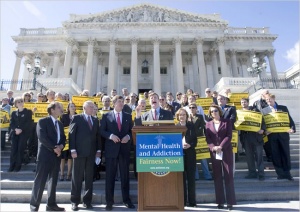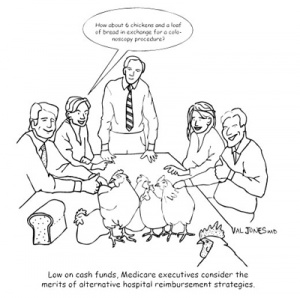Latest Posts
Back To Basics: How Much Protein Do You Need To Eat?
 It is estimated that 75% of our healthcare dollars are spent on chronic disease management, and that 80% of chronic diseases could be avoided with diet and lifestyle interventions. This means that the best way to decrease the size of our healthcare budget is to decrease the size of our collective waistlines. And that’s no small task.
It is estimated that 75% of our healthcare dollars are spent on chronic disease management, and that 80% of chronic diseases could be avoided with diet and lifestyle interventions. This means that the best way to decrease the size of our healthcare budget is to decrease the size of our collective waistlines. And that’s no small task.
Going back to basics – healthy eating and regular exercise – is such a simple message. But what is healthy eating exactly? Consumers are fairly exhausted by the complex messages they’ve heard about food and nutrition over the past couple of decades. One minute anti-oxidant foods are a miracle cure for everything from cancer to facial wrinkles, the next, it seems that they actually increase the risk of death. Diet advice ranging from low fat, low carb, to low sugar have all been promoted as the healthiest way to lose weight. But what does the evidence actually show? I decided to interview a series of experts to try to glean what I could about the state of nutrition knowledge. Today’s post is about protein – and I interviewed Nancy Rodriguez, PhD, a “protein scientist” to weigh in on this nutrient.
Dr. Val: We don’t talk about dietary protein needs that much, Nancy. Why is that?
Dr. Rodriguez: In the United States most people do get at least the minimum required amount of protein/day. The RDA (recommended daily allowance) of 0.8g/Kg of body weight is the amount you need to consume to avoid an outright protein deficiency. That’s about 3 ounces of chicken, fish, or meat/day – the size of a deck of cards. But the real benefits of protein include appetite suppression, and thermogenesis. Studies show that if people eat a little bit of protein with each meal, they’re less likely to become hungry between meals or consume as many calories overall. You also end up burning a few calories in the process of digesting protein.
Dr. Val: So what is the appropriate amount of protein intake?
Dr. Rodriguez: I have found that 1.2-1.5g/Kg may be optimal for hunger management. That means we should try to get a little bit of protein with each meal. Weight maintenance and loss is much easier to achieve if you don’t feel hungry all the time. Protein can really help with that.
Dr. Val: Is it possible to eat too much protein? Can it damage the kidneys in excess?
Dr. Rodriguez: I’ve conducted a few studies with participants eating 3g/kg of protein. That’s really hard to do. For example, you have to eat eggs and bacon for breakfast, 2 chicken breasts and veggies for lunch, and a 10oz steak for dinner. This is clearly in excess of what we need, though it’s hard to say if that level of protein is harmful. If someone has kidney disease, then obviously it would be a really bad idea to tax the kidneys with removing so many protein break down products. But people with normal kidney function didn’t seem to have a problem clearing the protein. Protein isn’t stored. When you consume more of it than your body needs, it is simply broken down and removed via the urine.
I personally don’t believe that excess protein causes kidney disease, but it can be a problem for those who have kidney disease. We would have to do some very long term studies of people eating very high protein diets for decades to find out if they end up with a higher risk of kidney disease. We just don’t know yet. But our kidneys have a tremendous reserve capacity to filter the blood. We can easily live with just one kidney – so it’s possible that healthy kidneys can handle high protein diets without injury. One thing that I certainly recommend – if you eat a lot of protein, you should drink a lot of water to help to flush out the break down products.
Dr. Val: Is it true that whey protein may help to reduce high blood pressure?
Dr. Rodriguez: Milk proteins are very interesting in that they contain a broad array of bioactive substances. There is increasing evidence that lactokinins can reduce blood pressure, but we just don’t understand the exact mechanism yet. We do know that people who eat more dairy products (included in the DASH diet plan) can lower their systolic blood pressure by an average of 10 mmHg.
Whey protein is also a natural appetite suppressant, so it can be helpful part of a weight loss strategy. Dairy sources of protein are an important part of a healthy diet.
***
I caught up with Nancy at the Dairy Science Forum on November 13th, 2008 in Washington, DC.
 |
|
Nancy Rodriguez |
Nancy Rodriguez, PhD, RD, CSSD, FACSM, is a professor of Nutritional Sciences in the College of Agriculture and Natural Resources (CANR) at the University of Connecticut, with joint appointments in the Departments of Kinesiology and Allied Health Sciences. She is director of Sports Nutrition in the Department of Sports Medicine in the Division of Athletics.
Improved Mental Health Coverage: Finally!
 |
I wrote a “reader take” for KevinMD a few weeks ago – basically arguing that disparities in mental health coverage are driving patients to seek help from unqualified (or inappropriate) providers, thus increasing healthcare costs without improving outcomes. Little did I know (at the time of writing my article) that mental health advocates would be successful in introducing a new law to address exactly this issue. The New York Times reported that some were hailing this legislation as:
A milestone in the quest for civil rights, an effort to end insurance discrimination and to reduce the stigma of mental illness.
And guess how this legislation was passed? It was the “pork” in the Wall Street bailout bill.
Now that’s some of the best pork I’ve heard of in recent memory.
To read my explanation of why improved mental health benefits are desperately needed, please check out my reader take at KevinMD. It’s called: How Not To Revolutionize Healthcare.
P.S. The delay in publication of my reader take was not Kevin’s fault. It was due to circumstances beyond our control. 🙂
Guest Blog Post At KevinMD: Chronic Disease Is Driving Healthcare Costs
Many thanks to my fellow blogger KevinMD who offered to host me during my period of blog homelessness. In this post, I interview Dr. Ken Thorpe about the real driver of healthcare costs:
About 75% of what we spend on healthcare is associated with chronically ill patients. That’s about 1.6 trillion dollars per year. Chronic disease accounts for the biggest source of spending in the healthcare economy, and it’s also the fastest growing – as more and more people are living with chronic illnesses. If we’re really serious about getting to the bottom of the healthcare affordability crisis, we’ll have to first address the chronic disease issue…
For the rest of the post, please click here.
Guest Blog Post At The Happy Hospitalist: Will You Outlive Your Savings?
Thanks to the Happy Hospitalist who hosted me during my time of blog homelessness. Check out this post:
My pediatrician is 90 years old. He worked hard and invested his money until age 65, and then retired. He told me that he is about to outlive his savings, and he worries that he will lose his home shortly. It disturbs me to think that such a hard working, responsible person who devoted his life to caring for sick children could end his days homeless and penniless. This is the reality of our current economy – even the most conservative investors are seeing their monthly income dwindle. And if a retired physician is having a hard time surviving, what will happen to the average American?…
For the rest of the post, please click here.











